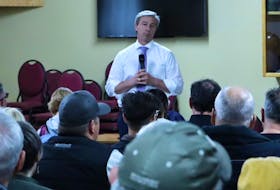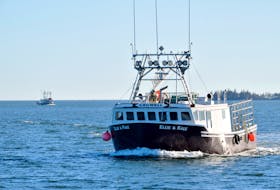In fact, the filmmaker who grew up in Scotsburn was working on a woodshed at his parents’ place, when he got a text informing him he was the winner of the Best Short Documentary Award at the Atlantic International Film Festival.
“Normally, the way it works, is if you’re being strongly considered for an award, the film festival gives you a heads up, saying something like ‘you might want to come to the awards ceremony – you never know,’ or something like that,” said Fraser.
“That wasn’t the case at all. This time, I was at home, building a woodshed, and got a text from a local director, Jason Levangie, saying I won this award,” he said.
Fraser received the award at the 37th annual Atlantic International Film Festival, from Sept. 14-12, for a 12-minute documentary about icebergs in Newfoundland. Invading Giants explored the relationship of the people of coastal Newfoundland with the icebergs that drift through the Atlantic waters in the area. The Best Short Documentary Award is one of a handful of awards Fraser has received for his work.
Fraser, a cinematographer by trade, wore a number of hats in the production of his award-winner, working alongside a small crew – he was the director and cameraman for the film.
Although he has won numerous awards and accolades for his contributions as a cinematographer alone, Invading Giants constitutes a new level of success for Fraser, since two dimensions of his talent have been observed – that of a cinematographer and a director.
When asked if it was challenging to take on the dual role of director and cinematographer, Fraser said, “it’s the only way I know how to work. I work for a lot of directors, and I know that craft inside-out.”
So far in his career, Fraser has not ever directed a film he has not also shot.
“I’m still learning, but it’s what I do. When I get to direct a project, I see it in pictures first. I think, for me, it would be odd to employ another cinematographer, when I know how I want to shoot something – it feels natural to me.”
Fraser admitted he wished he’d attended the ceremony at which he won the award.
“That ceremony was great news, but I really didn’t think we were being considered. There were so many incredible films in the festival this year,” said Fraser. “My partner Melani (Wood) and I work as a team. Everything I direct, she produces.”
Fraser recalled that Wood had suggested they may get recognition at the festival, but he assumed their work would be overlooked.
“But the judges liked it, and we’ll take it – it feels great,” he added.
The filming and production of Invading Giants did not involve a large crew. Fraser said the crew involved with the production stage was “extremely small,” involving himself, Wood and a sound person they hired in Newfoundland to help with the filming.
“We all wore multiple hats. The three of us made the film, and in the post-production, we had an offline editor who helped structure the piece and move things into place; an online editor who helped us do specific corrections to make the film better – basically making it pop – and a colourist, as well,” said Fraser. “Post-audio had two people involved.”
The post-audio work was a significant step in the creation of Invading Giants, Fraser noted, because it was essentially filling in sounds where a lot of the vital ambient oceanic sounds of the icebergs were drowned out by the sounds of outboard engines they had to travel on to get close to the bergs.
“The sounds the icebergs make when you’re next to them is magnificent, but the guys running the boats wouldn’t turn the engine off,” said Fraser. “They were cautious, in case one of the icebergs were to break or roll, so they had to have the engines running to be able to get out of there.”
Because of the racket the engines created, the natural sounds of the icebergs had to be digitally recreated in studio.
Although the film is only 12 minutes, Fraser said the project was much longer in the making. He started it in 2013, and it screened for the first time at the Hot Docks International Documentary Festival, in Toronto in 2017.
“It was an incredible festival,” said Fraser. “We both wanted to have that movie open at a festival like Hot Docs.”
Fraser, who took time to speak to the News on the set of a new project he’s working on, said he’s got a number of things on his plate at the moment. In addition to the “passion projects” he and Wood work on independently, both are employed in the film industry, doing cinematographic work and production work, respectively.
Fraser and Wood are working on another Iceberg film. The upcoming film be a longer-form production, and will have a broader scope than just the icebergs in the waters off Newfoundland.
“It’s going to be more of a global-scale project,” he said. “It will focus on the human relationships with icebergs – and all the interesting things happening with them.”








